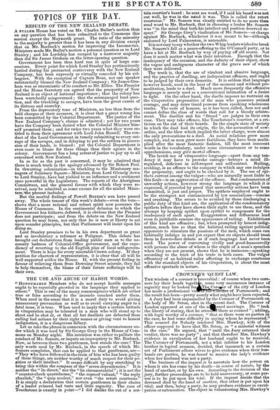CROWN S 'QUEST LAW.
THE wisdom of a coroner is u roverbial : of course when two coro- ners lay their heads togeth , some very uncommon instance of sagacity may be looked for The Coruiier of the city of London has made a professional vi A of Portsmouth ; and the result has been—pretty nearly what might have been expected. A Jury had been impannelled by the Coroner of Portsmouth on the body of Mr Seton, shot in th cent duel. The Coroner of London appeared at one of the a ed meetings. He " took the liberty of stating, that he atten there as counsel " ; adding, with logic worthy of a coroner, " that as there were no parties in the case, he had some difficulty in saying whom he represented." This counsel for Nobody tendered Mrs. Hawkey, wife of the officer supposed to have shot Mr. Seton, as " a material witness in the case." He argued, that " until the Jury returned their verdict, there was no party" ; and that therefore Mrs. Hawkey's evidence in exculpation of her husband ought to be received. The Coroner of Portsmouth, not a whit inferior to his London brother in logical acumen, decided, that inasmuch as a certain act of Parliament allows wives to give evidence when their hus- bands are parties, he was bound to receive the lady's evidence when her husband was not a party.
The business of the inquest is to ascertain how the person on whom it sits has come by his death—in course of nature, by the hand of another, or by his own. According to the decision of the jury, further proceedings are to be held unnecessary, or some per- son is to be out upon his trial. If the inquest decide that the deceased died by the hand of another, that other is put upon his trial; and then, being a party, he may produce evidence in excul- pation or extenuation. The object in volunteering Mrs. Hawkey's
evidence was to prove that her husband had a strong motive to kill Mr. Seton—so strong as almost to convert what might other- wise be accounted murder into justifiable homicide. In so far as Mrs. Hawkey's testimony had any bearing on the inquiries of the Coroner's Jury, she contributed circumstantial evidence towards establishing the fact that Mr. Seton fell by her hus- band's hand.
The two wise Coroners have dragged a lady before a Jury to give evidence, the only possible effect of which, they ought to have foreseen, would be to place her husband at the bar of a court of justice. The only conceivable motive for taking so extraordi- nary a step, can scarcely be regarded as a palliation of it. It seems to have been dome for the purpose of creating, by irregular means, a prepossession in Mr. Hawkey's favour, against the time of his being put upon his trial. For this purpose, a lady has been sub- jected to the necessity of twice making a public statement of a nature most painful to any woman possessed of feminine delicacy, when once would have been sufficient. Mrs. Hawkey has been produced before the Coroner's Jury—where there was little chance of her being subjected to cross-examination, and none of her be- ing disproved by counter-evidence—to tell a story which blackens the memory of the dead and glances injuriously at the reputation of his widow. It is scarcely possible to imagine a lady so far lost to the delicacy of her sex as to take such a step of her own ac- cord : the culpability of those inconsiderate advisers who have urged her on to it, is only second to that of the egregious Magis- orates who lent themselves to carry the plan into effect.



























 Previous page
Previous page